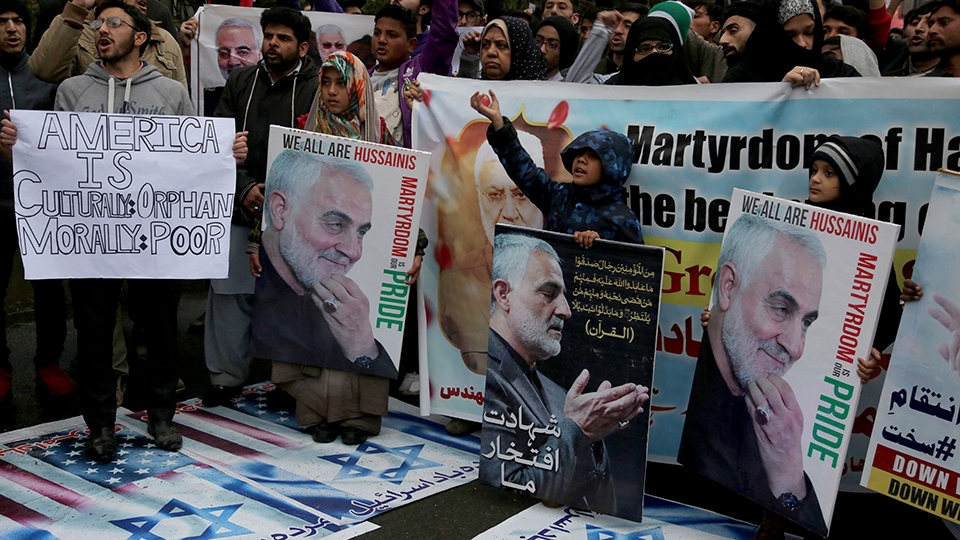
Editor's note: Lionel Vairon is a former French diplomat and university professor; he is also the president of CEC Consulting and senior researcher of Charhar Institute in Beijing. The article reflects the author's opinions and not necessarily the views of CGTN.
The presentation to the United Nations Human Rights Council of a report on the assassination of Iranian General Qasem Soleimani by the United States highlights, yet again, their negation of international law. "Major General Soleimani was in charge of Iran military strategy, and actions, in Syria and Iraq. But absent an actual imminent threat to life, the course of action taken by the U.S. was unlawful" Special Rapporteur Agnès Callamard wrote in her report.
Naturally, Washington immediately reacted to the presentation of the report through the spokesperson for the U.S. Department of State, Morgan Ortagus, claiming that "this tendentious and tedious report undermines human rights by giving a pass to terrorists and it proves once again why America was right to leave" the UN Human Rights Council.
Furthermore, the United States have been claiming the existence of an "immediate threat" to their interests but have yet to provide any evidence to support their claims. From an international law standpoint, the assassination of General Soleimani on Iraqi soil, on an official visit requested by the Iraqi government, is a clear violation of its rules by a power which intends to force its political and economic model on the planet, and to dictate to recalcitrants their conduct when managing their own affairs, with the use of force if deemed necessary.
The assassination of General Soleimani on January 3, 2020 and the ensuing declarations of the Trump administration have plunged the entire international community in a new era of uncontrolled and rogue U.S. policy.
On January 13, in his "Restoration of Deterrence: The Iranian Example" speech at the Hoover Institute, State Secretary Mike Pompeo made a declaration that strangely went unnoticed by media. Claiming the legitimacy of General Soleimani's assassination, he announced that it was the new U.S. policy of dissuasion, intended to all enemies (or opponents?) of the United States, mentioning Russia and China as examples.
This threat clearly confirms the drift of the Trump administration foreign policy which has become openly threatening, aggressive, conflictual and more importantly, which obviously ignores international law, or at least what remains of it after the illegal invasion of Iraq in 2003, as well as rules that have until now more or less efficiently governed international relations.
Mike Pompeo's speech presents an even bigger challenge to the international community: are the United States now willing to assassinate Russian or Chinese heads of security services, or even politicians, in order to assert their domination? This is not a new phenomenon, but it was usually concealed by coups set up by secret services, such as those that led to Salvador Allende's downfall in Chili or Ngo Dinh Diem in South Vietnam. In this light, believing in maneuvers from Washington regarding the eviction of Bolivian President Morales or the attempts to overthrow the Venezuelan President Maduro does not require one to be a conspiracy theorist.
The issue is not the quality of the governments or leaders in question, which are subject to different appreciations, but the legitimacy of foreign interventions in regime change. Were the overthrows of Saddam Hussein in Iraq or of Colonel Ghaddafi in Libya, the tragic consequences of which on both the populations and the regions are known, legitimate?

Demonstrators burn the U.S. and British flags during a protest against the killing of Soleimani in Tehran, Iran, January 3, 2020. /Reuters Photo
Demonstrators burn the U.S. and British flags during a protest against the killing of Soleimani in Tehran, Iran, January 3, 2020. /Reuters Photo
What are the grounds for the self-given right of United States – the "the indispensable nation" as Madeleine Albright used to say – to reshape other nations to their convenience? Does the respect of UN resolutions, which was so promptly demanded by Washington when accusing Saddam Hussein's Iraq or the Islamic Republic of Iran, not apply to the illegal colonization of Palestine by Israel, or to extraterritorial assassination by Saudi Arabia?
Iran has become the favored target of the American administration for mainly three reasons: obtaining the downfall of the Islamic regime in order to compensate for the humiliation suffered in 1979 with the hostage crisis at the American embassy in Tehran after the beginning of the Islamic revolution; supporting Wahhabi Saudi Arabia against its Shia and Persian enemy, Saudi Arabia who, despite being the leading customer of the American arms industry, is unable to defend itself, the first Gulf war being a notable example; finally, making China's oil supply more fragile by reinforcing sanctions.
The lack of a clear policy from the European Union has allowed Washington to progressively lead Brussels to an exit of "The Joint Comprehensive Plan of Action" agreed upon in Vienna. Despite having, according to the IAEA, respected the agreement when the United States still recognized it and then when the EU was promising to find a solution to the withdrawal of the U.S. in order to circumvent the new American sanctions, Iran is now accused of not respecting it by resuming its uranium enrichment operations.
The United States withdrew from the agreement, European companies left Iran under the threat of new American sanctions from which their governments could not protect them, and yet Iran is the focus of all criticism. How can Iran, China, Russia, or any other country, still trust any agreement signed with Europeans and Americans?
Why should Iran, which was on the receiving end of the Iraqi attack supported by Western powers during the Iran-Iraq war, now also give up on its ballistic missiles program which is a core element of any true national defense. This pattern eerily resembles the situation of Saddam Hussein's Iraq in the 1990s: the United States requested and obtained the disarmament of the country through UN resolutions and sanctions before invading the consequently defenseless country.
The lesson is significant for other nations in front what is now an out of control American power, the American executive having clearly decided to ignore the opinion of the Congress. One question remains: where will this policy lead our world?
(If you want to contribute and have specific expertise, please contact us at opinions@cgtn.com.)